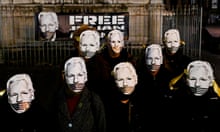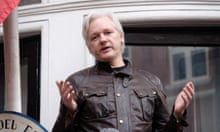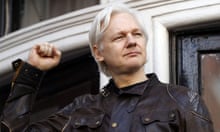Julian Assange has been warned by the judge in his extradition case that he could be removed from court with the case continuing in his absence after he interjected while a lawyer for the US authorities sparred with a high-profile witness giving evidence in support of the WikiLeaks founder.
The incident came on the second day of Assange’s extradition hearing at the Old Bailey, where the founder of the legal charity Reprieve, Clive Stafford-Smith, said “grave violations of law” such as the use of US drones for targeted strikes in Pakistan had been brought to light with the help of documents published by WikiLeaks.
Questioned by James Lewis QC, acting for the US authorities, Stafford-Smith was told, however, that Assange was not being prosecuted because of the leaked cables which he had cited. Rather, the US charges related to the publication of the names of informants in Iraq and Afghanistan that had put their lives at risk.
“You cannot tell this court how this case will be prosecuted, you’re making things up,” said Lewis, to which Stafford-Smith replied: “I can tell you how American cases are prosecuted.”
As the men continued their exchange, Judge Vanessa Baraitser called a halt and adjourned the hearing for 10 minutes when there was an attempted interjection by Assange. The comments could not be heard by journalists, who are following proceedings on a videolink from another court, but some of those inside the courtroom said Assange was heard to say “this is nonsense” in reference to the position put forward by Lewis.
Giving him what she said was a warning, Baraitser told him: “I understand you’ll hear things you disagree with … and you’d like to contradict and speak about these things yourself, but this is not your opportunity to do so.
“If you interrupt proceedings it is open to me to proceed in your absence. This is obviously something I would not wish to do.”
Stafford-Smith was giving evidence on the second day of a four-week hearing at the Old Bailey, where the WikiLeaks founder is resisting an application to send him to the US to answer an 18-count American indictment. Assange has been formally rearrested on a new US indictment, which updates and broadens previous charges. All but one are for violations of the country’s Espionage Act.
US cables published by WikiLeaks had contributed to court findings that criminal proceedings should be taken against senior US officials involved in such strikes, Stafford-Smith said in a witness statement.
Giving evidence in court about what he described as “a targeted assassination programme” by the US military in Afghanistan and Pakistan, he said the targets had included a US national who worked as a journalist.
Stafford-Smith, a dual US-UK national who founded Reprieve in London in 1999, said that as an American citizen he believed evidence of US war crimes and human rights violations was of “vital ongoing significant to the very soul of our nation”.
“I say this more in sadness than anger. I would never have believed that my government would do what it did. We are talking about criminal offences of torture, kidnapping, rendition, holding people without trial.”
He said leaks had revealed the US allegations against clients held in Guantánamo, which he was then able to prove as “nonsense”.
Cross-examining, Lewis said Assange was not being prosecuted in the US for publishing cables, which had previously been reported in the New York Times and Washington Post, or hundreds of thousands of others.
He said: “Mr Assange is not being prosecuted for publishing those cables or anything other than the documents which contain the names of informants which put their lives at risk.”
Assange has been held on remand in Belmarsh prison in south-east London since last September after serving a 50-week jail sentence for breaching his bail conditions while he was in the Ecuadorian embassy in London for almost seven years.
On Monday, lawyers for Assange failed to adjourn the extradition case against him after objecting to newly introduced US prosecution evidence accusing him of recruiting hackers to steal military secrets.
Evidence was also given for a second day by Mark Feldstein, a US journalism professor and former investigative journalist who was called as an expert witness by Assange’s legal team. Donald Trump’s administration had pursued Assange despite a previous decision by US authorities not to prosecute him, he told the court via a video link.
He said the situation changed after Trump came to power, and the then FBI director James Comey brought up the issue of plugging leaks, reportedly suggested “putting a head on a pike as a message”.
But Feldstein came under pressure later from Lewis, who sought to question what he said was the assertion by Feldstein that the charges were politically motivated. He also accepted that there was an “obvious risk” to the safety of informants who were publicly named in leaked documents and that it was not “responsible journalism” for the website co-founded by Assange to publish the records
While Feldstein had said the US position in relation to pressing charges against Assange had crucially changed under the Trump administration, Lewis brought up a WikiLeaks tweet from 2016 to argue that Assange and his colleagues accepted that he could still have faced charges under the White House of Barack Obama.
In it, the official WikiLeaks Twitter account had said that Assange “will agree to US prison in exchange – despite its clear unlawfulness” if Obama granted clemency to Chelsea Manning, the former US army intelligence analyst responsible for turning over a vast trove of military and diplomatic documents to WikiLeaks.
Feldstein said he did not see how the tweet shed much light on what Assange thought about the state of the US grand jury or its investigation into him during the Obama era. What mattered, he argued, was what had been said by people close to the Obama administration, such as a former spokesman for the US justice department who reportedly said that prosecuting Assange for something journalists do all the time would set a dangerous precedent.
The case continues on Wednesday.









